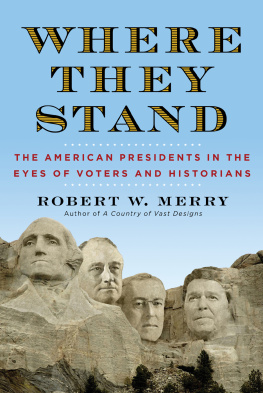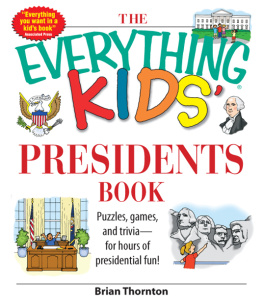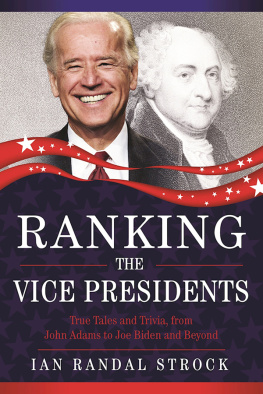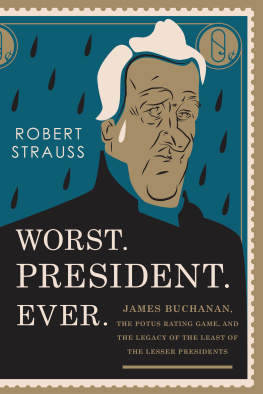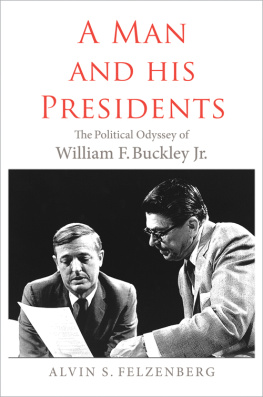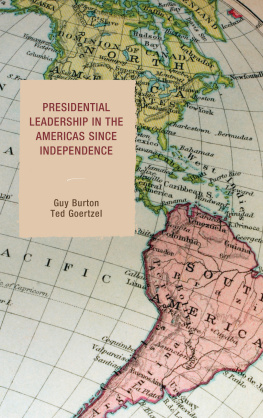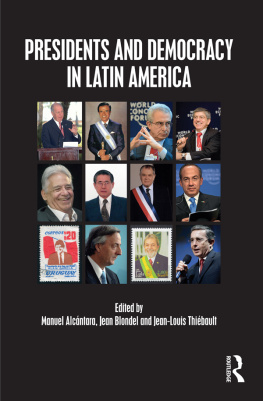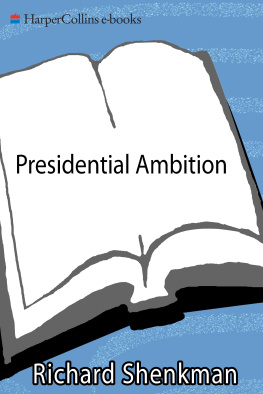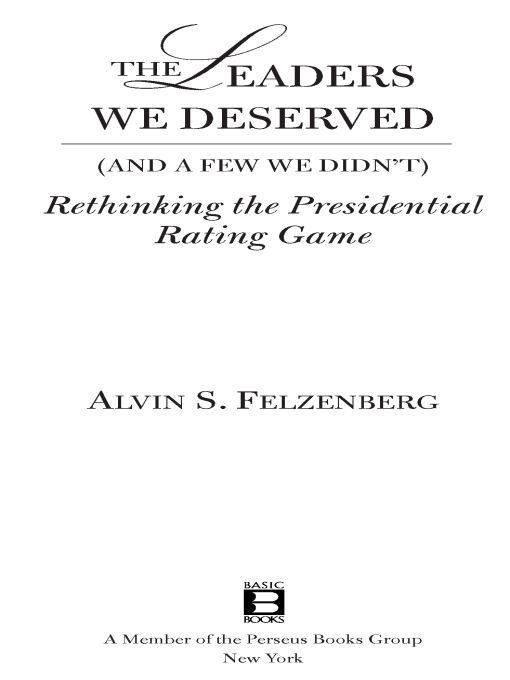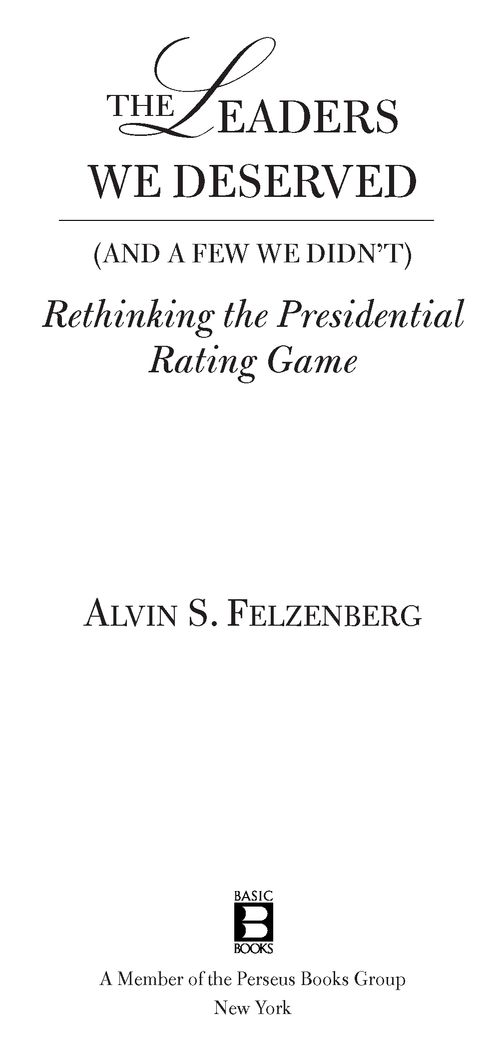Table of Contents
To my friend, Robert P. OQuinn,
who patiently tries to teach me economics.
PREFACE
What makes a president a great president? Since the presidency was established in 1789, Americans have asked themselves that question. In order to help answer it, historians and other experts have surveyed their peers. Most of these assessments say more about what evaluators thought of the nations presidents than about the criteria they used in forming their conclusions.
Most of these surveys place the nations presidents into one of six categories: great, near great, high average, low average, below average, and failure.
These surveys suffer from a number of weaknesses. For example, their results often reflect the ideological predilections of the evaluators. While this flaw can easily be remedied by assuring greater balance in the choice of participants, other problems inherent in this process cannot. Failure to set forth precise criteria has been already noted. Equally troubling has been the tendency of some jurors to reflect the findings of past surveys. Being too far out of step with the prevailing consensus among ones peers may call ones status as an expert into question.
In the dozen or more surveys since Arthur M. Schlesinger Sr. commenced what this book calls the presidential rating game in 1948, only two presidents have seen their ratings substantially change. Because scholars interpretation of the Reconstruction era began to change during the civil rights revolution of the 1960s, Andrew Johnson, once considered an average president, is now rated a failure. The opening of Dwight D. Eisenhowers papers a decade or so after he left office shed new light on his managerial style and administrative competence. Consequently, survey participants have moved Ike from the ranks of low average into the company of the near greats. In most other cases, the uniformity of presidential rankings in most surveys bears a closer resemblance to an echo chamber than to a serious attempt to interpret history and impart knowledge. Even the briefest perusal of presidential biographies suggests that very few presidents performed equally well or equally poorly in all areas. Those ranked among the near greats sometimes failed, while many average or worse presidents performed some tasks admirably. These are seldom reflected in their ratings.
Woodrow Wilson, for instance, traditionally rated as near great, set back the cause of equal opportunity for African Americans considerably during his eight years in the White House. This has not had a discernible effect upon his rating. Yet, lowering Wilson several notches, as has been done with Andrew Johnson, would obscure Wilsons extraordinary successes in bringing about badly needed economic reforms, such as the creation of the Federal Reserve System. Likewise, viewing Wilson exclusively through the lens of his refusal to make the compromises necessary to assure American participation in the League of Nations would fail to do justice to his superior administrative capabilities, including his successful management of American participation in a world war and the extraordinary legislative achievements he attained, especially during his first term. All this argues for assessing Wilson according to several criteria, rather than just one.
At the same time, Ulysses S. Grant, who repeatedly ranks as a failure, often acted decisively and out of his empathy for the victims of racial persecution, sometimes at great cost to his popularity. His actions in this area have largely been lost to readers of history. Grants successes and failures, like Wilsons, should be judged according to more than one standard. Such an approach would demonstrate that Grant was far from the incompetent he is so often made out to be. As president, he achieved almost all he set out to do and most of his objectives were high-minded.
Andrew Jackson, who usually ranks among the nations top half-dozen presidents, is even more problematic. Jackson, too, succeeded at all he attempted and strengthened the institutional powers of his office. Yet in some instances, especially in his approach to human rights and the nations finances, Jacksons policy successes brought disastrous results. But the existing surveys make no allowance for such distinctions. Historians who participate in them do acknowledge the problems inherent in evaluating Lyndon B. Johnson. How can his spectacular domestic achievements, especially in civil rights, be weighed against one of the greatest foreign policy failures in American history, his decision to engage the United States in a war in Vietnam, and the incompetent manner in which he waged it? Surveys tend to average the totality of Johnsons achievements and failures. No one who has studied LBJ, however, would regard his performance in anything as average.
Instead of assigning presidents a single score, the chapters that follow will evaluate the nations presidents according to six criteria I have developed. The first three are internal attributes: character, vision, and competence. These often determine how a president approached the next three important policy realms in which all presidents engage: economic policy, the preservation and extension of liberty, and national security and defense. This approach will inevitably lead to a shift in the fundamental question from What makes a president great? to At what did a particular president perform well and at what did he fare poorly? In this survey, some presidents, like Abraham Lincoln, received the highest score in every category, while others, such as James Buchanan, came in at the bottom in every categoryjust where conventional surveys place them. Most of the others, like most other mortals, varied considerably from category to category.
Readers need not subscribe to all of this books conclusions to find its approach useful in evaluating past, present, and future presidents. Hopefully, this will prove one of its strengths. In assessing the actions of their leaders, each citizen brings to the task his or her own view of what a particular president should have done. Greatness, like failure, often lies in the eyes of the beholder. How we judge political actors often says as much about us as it does about them. So let the game begin.
THE RATING GAME
This books origins go back to a cold, dreary December day in 1996. As I sat down to breakfast with the New York Times Magazine, its cover story caught my attention. The article, The Ultimate Approval Rating, by Arthur M. Schlesinger Jr., contained the results of a survey he conducted, in which he asked leading historians to evaluate U.S. presidents.
Schlesinger Jr.s survey replicated and updated those that his father, Arthur M. Schlesinger Sr., conducted in 1948 and 1962. Both men asked their fellow historians to place each of the nations presidents into one of five categories: great, near great, average, below average, and failure.
The popularization of Schlesinger-style surveys, however, freed journalists, political commentators, museum curators, and students of all ages from having to offer evidence in support of their opinions. All they had to do was to cite the collective assessment of the experts. Writers of textbooks and encyclopedias were only too happy to oblige, rushing results from the latest survey into print, often without interpretation. Slowly, the air of authority that these surveys conveyed replaced serious argument among many of their readerssave for those who happened to be specialists in one or more presidencies.


